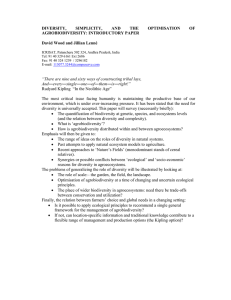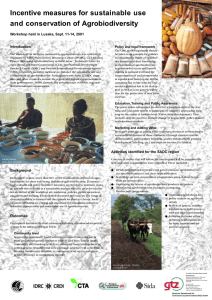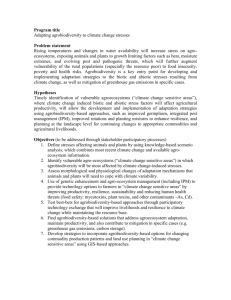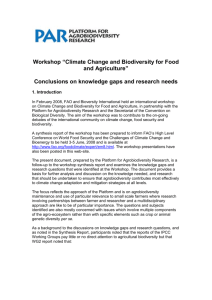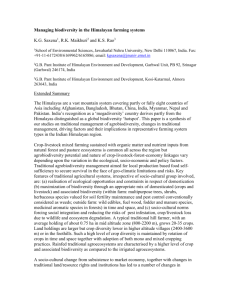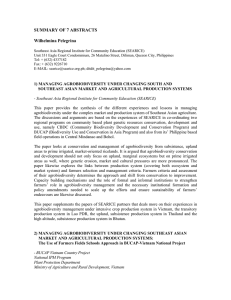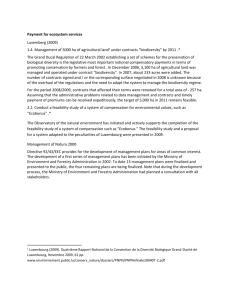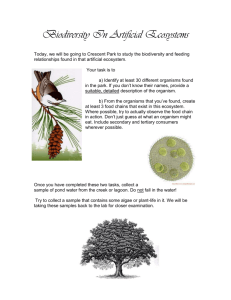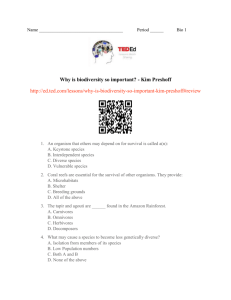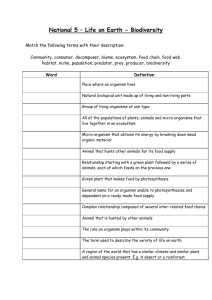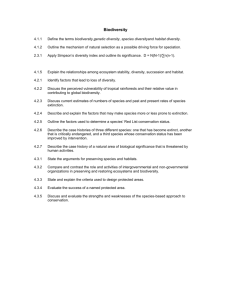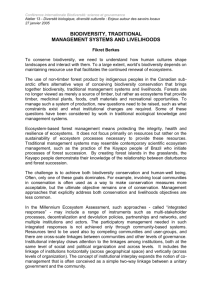Land sparing and land sharing - the Biodiversity Research Centre
advertisement
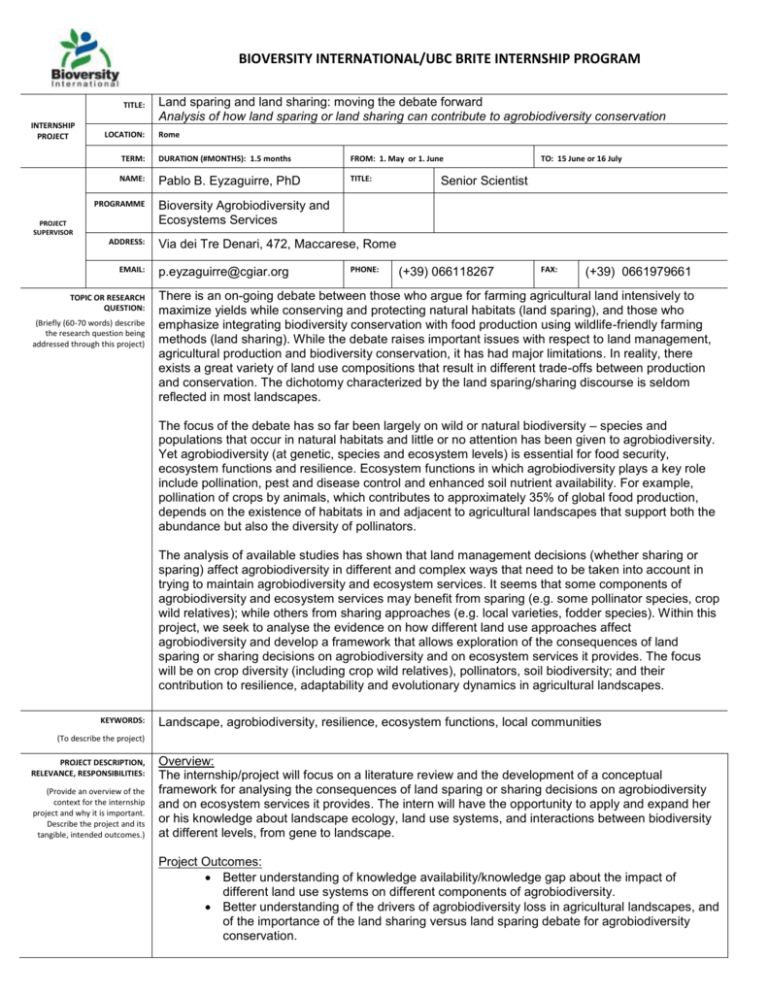
BIOVERSITY INTERNATIONAL/UBC BRITE INTERNSHIP PROGRAM TITLE: INTERNSHIP PROJECT LOCATION: Land sparing and land sharing: moving the debate forward Analysis of how land sparing or land sharing can contribute to agrobiodiversity conservation Rome TERM: DURATION (#MONTHS): 1.5 months FROM: 1. May or 1. June NAME: Pablo B. Eyzaguirre, PhD TITLE: PROGRAMME PROJECT SUPERVISOR ADDRESS: EMAIL: TOPIC OR RESEARCH QUESTION: (Briefly (60-70 words) describe the research question being addressed through this project) TO: 15 June or 16 July Senior Scientist Bioversity Agrobiodiversity and Ecosystems Services Via dei Tre Denari, 472, Maccarese, Rome p.eyzaguirre@cgiar.org PHONE: (+39) 066118267 FAX: (+39) 0661979661 There is an on-going debate between those who argue for farming agricultural land intensively to maximize yields while conserving and protecting natural habitats (land sparing), and those who emphasize integrating biodiversity conservation with food production using wildlife-friendly farming methods (land sharing). While the debate raises important issues with respect to land management, agricultural production and biodiversity conservation, it has had major limitations. In reality, there exists a great variety of land use compositions that result in different trade-offs between production and conservation. The dichotomy characterized by the land sparing/sharing discourse is seldom reflected in most landscapes. The focus of the debate has so far been largely on wild or natural biodiversity – species and populations that occur in natural habitats and little or no attention has been given to agrobiodiversity. Yet agrobiodiversity (at genetic, species and ecosystem levels) is essential for food security, ecosystem functions and resilience. Ecosystem functions in which agrobiodiversity plays a key role include pollination, pest and disease control and enhanced soil nutrient availability. For example, pollination of crops by animals, which contributes to approximately 35% of global food production, depends on the existence of habitats in and adjacent to agricultural landscapes that support both the abundance but also the diversity of pollinators. The analysis of available studies has shown that land management decisions (whether sharing or sparing) affect agrobiodiversity in different and complex ways that need to be taken into account in trying to maintain agrobiodiversity and ecosystem services. It seems that some components of agrobiodiversity and ecosystem services may benefit from sparing (e.g. some pollinator species, crop wild relatives); while others from sharing approaches (e.g. local varieties, fodder species). Within this project, we seek to analyse the evidence on how different land use approaches affect agrobiodiversity and develop a framework that allows exploration of the consequences of land sparing or sharing decisions on agrobiodiversity and on ecosystem services it provides. The focus will be on crop diversity (including crop wild relatives), pollinators, soil biodiversity; and their contribution to resilience, adaptability and evolutionary dynamics in agricultural landscapes. KEYWORDS: Landscape, agrobiodiversity, resilience, ecosystem functions, local communities (To describe the project) PROJECT DESCRIPTION, RELEVANCE, RESPONSIBILITIES: (Provide an overview of the context for the internship project and why it is important. Describe the project and its tangible, intended outcomes.) Overview: The internship/project will focus on a literature review and the development of a conceptual framework for analysing the consequences of land sparing or sharing decisions on agrobiodiversity and on ecosystem services it provides. The intern will have the opportunity to apply and expand her or his knowledge about landscape ecology, land use systems, and interactions between biodiversity at different levels, from gene to landscape. Project Outcomes: Better understanding of knowledge availability/knowledge gap about the impact of different land use systems on different components of agrobiodiversity. Better understanding of the drivers of agrobiodiversity loss in agricultural landscapes, and of the importance of the land sharing versus land sparing debate for agrobiodiversity conservation. Intern Responsibilities: The intern will review the relevant literature on the conservation of crop diversity. (including crop wild relatives), pollinators and soil biodiversity in agricultural landscapes. The intern will contribute to the development of the conceptual framework for analysing the impact of different land use systems on agrobiodiversity and ecosystem functions. AVAILABLE FUNDING: NO YES IF YES, THEN LIST AMOUNT: 300$ PROJECT TYPE (Check the relevant type(s) of work to be undertaken for this internship) FIELD WORK GIS ANALYSIS (potentially if the student has the skills and interest) RESEARCH PROPOSAL DEVELOPMENT POLICY ANALYSIS LITERATURE REVIEW SURVEY DESIGN SHORT STUDY / ASSESSMENT MODEL DEVELOPMENT (research prioritization framework) DATA COLLECTION OTHER please describe: DATA / STATISTICAL ANALYSIS EXPECTED DELIVERABLES: (Summarize the intended internship project deliverables, e.g., research report, data analyzed, etc.) An annotated literature review on current knowledge about effect of different land use systems on agrobiodiversity including a brief analysis of literature. Input into the development of the conceptual framework for evaluating the effect of land use systems on agricultural biodiversity by helping to identify the key questions and complexities involved in the maintenance of agrobiodiversity with respect to scale, spatial variability patterns and ecological interactions. Report on contrasting strategies that might be needed for agrobiodiversity conservation and relative benefits of sparing versus sharing including a reflection on/discussion of the complexities mentioned above. QUALIFICATIONS AND EXPERIENCE: (List the required and desirable knowledge and experience) The candidate should have knowledge and interest in landscape ecology The candidate should have a good understanding of the functioning of agro-ecosystems and the multiple scales/components of agrobiodiversity, and of interactions between them. The candidate should have an understanding of the threats to agrobiodiversity The candidate should have interest in traditional agricultural systems and landscape mosaics including traditional knowledge and practices guiding the management of such systems. ABOUT BIOVERSITY INTERNATIONAL CONTACT FOR INTERNSHIP: Bioversity International undertakes, encourages and supports research and other activities on the use and conservation of agricultural biodiversity, especially genetic resources, to create more productive, resilient and sustainable harvests. Our aim is to promote the greater well-being of people, particularly poor people in developing countries, by helping them to achieve food security, to improve their health and nutrition, to boost their incomes and to conserve the natural resources on which they depend. The organization is active in over 100 countries worldwide, with more than 300 staff working from some 16 country offices. It is part of the Consultative Group on International Agricultural Research (CGIAR) which works to reduce hunger, poverty and environmental degradation in developing countries by generating and sharing relevant agricultural knowledge, technologies and policies. This research, focused on development, is conducted by a Consortium of 15 CGIAR centres working with hundreds of partners worldwide and supported by a multi-donor fund. Bioversity’s headquarters are located just outside Rome, Italy in Maccarese. http://www.bioversityinternational.org/ For more information on internship placements, contact: Per Rudebjer, a.i. Head, KMSC Unit: p.rudebjer@cgiar.org, Tel: +39 06 6118 388 Revised April 2009
